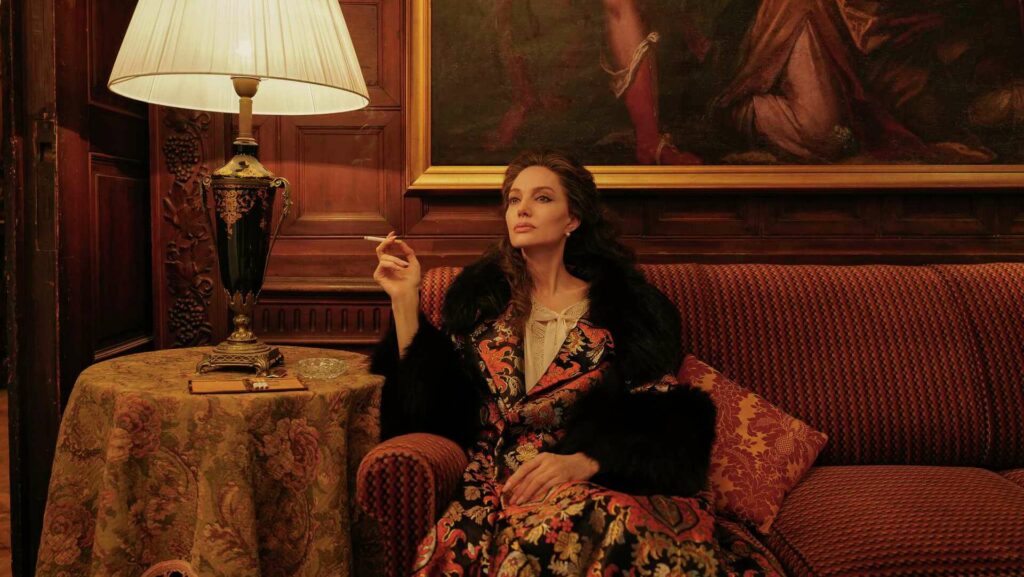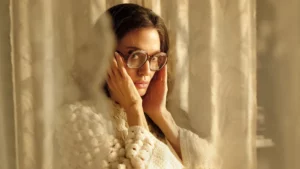I spent way too much of my viewing time for Maria wondering what ChatGPT prompt was used to generate this movie. It all feels way too algorithmic – something designed to demonstrate the ability of computer technology to swap Angelina Jolie into famous images and video clips of Maria Callas and somehow win Angelina Jolie an Oscar in the process.
The technology is impressive and La Jolie suffers and lip synchs convincingly, but the film makes no effort to help a viewer who may not already know key details of Callas’s biography and important sixties celebrities. As demonstrated by this film and Maestro, Netflix will only make biographies of celebrated classical musicians if they are as confusing as possible.
Brief snippets of the movie – a surreal manifestation of Madame Butterfly outdoors in the pouring rain – hint at what this movie could have been, but in the end its special effects without causes.
I take no joy in saying that I found this film deeply disappointing. Although not as surrealistic as Pedro Larrain’s “Spencer” (which I found perverse) it is nonetheless an odd fantasia on the final days of Maria Callas in the Paris of 1977 replete with florid hallucinations, ghosts, and conjectures on her backstory and behavior, some lovely and some confusing. Any filmmaker deliberately trying to be profound invariably just ends up steering into the weeds of ridiculousness. The subject needs to establish its own weight. Angelina Jolie portrays the stereotypical diva which I think bears little resemblance to the actual Callas according to her intimates. Thanks to makeup and lighting, the resemblance is eerie at times. She’s certainly got the haughty allure down as well as the clipped diction. The costumes have been very carefully curated and the VFX people have done a magnificent job of conjuring the memories of her stage career at La Scala, La Fenice, etc. The clothes do the heavy lifting, however. Her actual singing as it pertains to having to portray a diva in vocal distress is fearless in the moments when it’s actually Ms. Jolie. In the closing of the film, when they gently meld the two performances it’s seamlessly accomplished. Sadly the script completely lacks any kind of drama, conflict, or real humor. They should have filmed Terence McNally’s “Master Class” instead and at least given us something to enjoy, and something substantial for Ms. Jolie to sink her teeth into, instead of this slow funereal stroll through Paris.
Aprile Millo
How terrific it is to have an actress as important and as special as Angelina Jolie, part of a film about opera in which she was so respectful and so truly soulful and decent about her approach for training to sing and portraying such an important historical character, and beloved artist. It concentrates on a part of her life, which was very poignant to me and very sad. The film itself is exceedingly sad. And made up of a lot of assumptions written by opportunistic people writing books trying to make money on her life and death. I think she would have dug a hole and head straight into to avoid having people see her in what looks to be a difficult part of her life. This is a lioness. Miss Jolie does a very beautiful job and is very respectful. She cannot hint at the strange alchemy that was Maria Callas and the movement of Maria Callas and the stillness of Maria Callas. But like all things that try to examine greatness, they are not on a ladder high enough to reach her. Imitation is always flattery but in this case, it doesn’t really deliver on the genius that she was. We get to be an imaginary fly on the wall in some of these extraordinary moments of her life which are pretty much indelibly imprinted on every opera fan’s mind, the constant fan approach of wanting the Callas and not the Maria. The most exciting parts of the film are when they depict Callas on stage, and her voice is singing and again we are reminded of the incredible excitement she brought. The last scene when she was singing the prayer is perhaps the most heartbreaking. Her maid Bruna at least had a proper reaction, whereas they made the butler devoid of feeling. No matter what, Maria or La Callas is in the corridors of history. She wins by virtue of her unbelievable magic, sacrifice and Divine gift. My heart always will embrace her and hug her with my soul for all she has given brave and indomitable in service to music. The chance to really know her or experience her through this film are in the home movie clips played at the end which are very expressive, incredibly human, and magic at the same time. And so full of nuance and character and personality.
Niel RishoiIt’s a long, depressing wallow-slog.
Angelina Jolie really invested her valiant efforts here, with sincerity, great compassion, and dedication. Quite often she gets the speaking voice right, too; but other times not so much.
But try as I might, I could not suspend Jolie into and see a manifestation of Callas.
Jolie (through no fault of her own) does not begin to suggest Callas’s sturdy, earthy, thoroughbred Greek physical persona. Jolie is very slight, with a long thin neck (the big hair scenes overwhelm her), pronounced, pouffy lips, and her face sunken and drawn in the cheekbones. In fact she looks much too contemporary, of a kind prevalent in diet-obsessed models and actresses.
The script is disjointed, the situations presented wildly improbable. Events and statements appallingly suspect and out of the range of credibility. The dialogue does not ring true a good deal of the time. I don’t know what director Pablo Lorrain’s intentions were. It seems to be Callas’s Fever Dreams While on Quaaludes. Her imaginary filmmaker is named Mandrax, the chemical name of the drug.
Like the equally disjointed and lacking-in-cohesion Bernstein biopic “Maestro”, “Maria” is just a mess.
This film appealed to the Callas skeptic in me — I don’t deny her talent, but I don’t think there’s anything new she can give us beyond what she already left behind. Of Pablo Larraín’s famous women biopics, Callas is the only artist in the traditional sense and his interest in those questions of art, interpretation, and truth are palpable. And while the movie brings the historical specificity of the highly linear Jackie (which I hated), it borrows more tonally from the iconoclastic dreaminess of Spencer (which I liked quite a bit more).
Angelina Jolie is fine and unshowy in the central part, a Maria that often speaks in vague, Delphic pronouncements. It’s not clear how reliable a narrator she is even to herself, much less to anyone in her company (or to us). She is herself, in many senses, the bona fide Callas fan – not McNally’s bitchy scheming Mendy or quipping harridan Maria, but one whose nostalgia is a self-smoldering smugness. For an opera fan, the most relatable thing this Maria does is wander through her apartment mouthing along to “Vissi d’arte.” It’s also what kills her. Callas was dead: to begin with, we stand to be reminded. There is no doubt whatever about that.
Perhaps I feel too close to the subject matter, but despite the film being a serious effort, I found it rather unsatisfying, and unrelentingly depressing. Angelina Jolie worked hard at the Callas impersonation, and certainly nailed the speaking voice. I’m unclear on what it set out to accomplish, however, as a treatment of Callas, her life, her art, even her sad end. Somehow – and this is just my feeling – something as irreverent as brilliant Charles Ludlam’s “Galas” found its way to being more reverent and revelatory.
Who remembers Terrence McNally’s lovely play The Lisbon Traviata or a photograph of that fabled 1958 production with a caption that read “Even the hands are crying . . . “? Those examples got something basically right about Maria Callas which—in response to the movie Maria—might be summed up with the comment, “It’s about the music, stupid!” Which is to say; of course she was a diva and, like a true diva, both a gorgon and a myth, which (to correct Oscar Wilde) is entirely fair. But her excesses (in quali eccessi o numi!) were about the music. When she refused Rudolf Bing’s order to sing two vocally incompatible roles in one week (Butterfly and Lucia, if I remember correctly), it was because she required time to work the alternate role into her voice. Listen to a single phrase from “Casta diva” or anything else and you will hear a musicality that cannot be imitated, duplicated, or surpassed. In reestablishing bel canto, Callas validated it as music drama for our time.
Maria is now streaming on Netflix.


